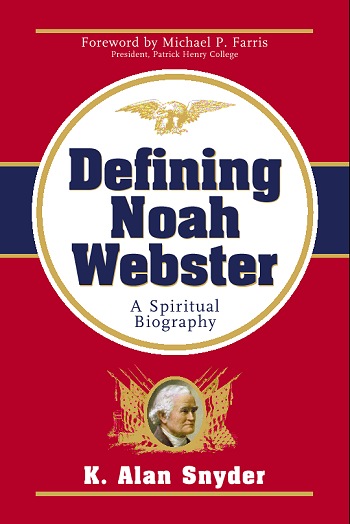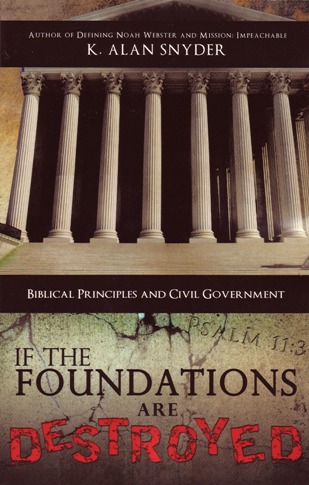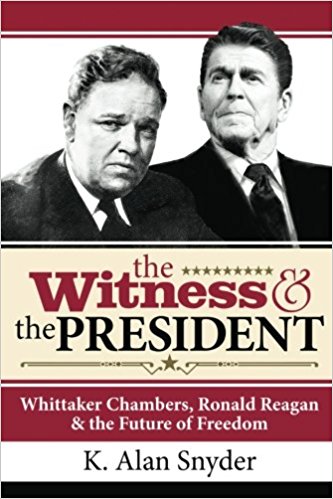What does the title of this blog post mean? It sounds kind of contradictory, doesn’t it? Yet it expresses what is happening in my thinking and reflections on God, man, the church, our society, and the political ramifications that flow from our beliefs about all of those. If you have been a regular reader of my blog over the years, you probably already know some of the thought processes I’ve been experiencing, especially in the last six or seven years. My bedrock convictions have not changed, yet God has been changing me in other ways.
Let me try to explain. The best way may be to comment on the books I’ve written. No, this is not meant as a commercial for buying the books, but I certainly won’t stop anyone who may be intrigued by them.
My completed doctoral dissertation was an intellectual and spiritual examination of the man who is considered the Father of Early American Education–Noah Webster. Why did I choose Webster as my subject? As a Christian historian steeped in an appreciation for the founding of the United States and the Christian faith that was a significant part of that founding, I saw Webster as an excellent example.
He was raised as a typical Congregationalist, yet didn’t become a heartfelt Christian until a conversion experience around his fiftieth birthday. He partook, therefore, of both the Enlightenment and Christian strains in early America. From my perspective, I wanted to highlight the Christian aspect of his life and how it affected all he did for the nation educationally. To this day, I continue to seek to highlight the Christian input into our history. That hasn’t changed. What has changed, though, is a more critical analysis of some of that Christian input. As I consider what is happening currently with a rise of a more pronounced Christian nationalism that seems to welcome greater government involvement in directing the beliefs of the nation, I have been able to take a step back and reconsider who, in our history, was a better proponent of Biblical principles and who was not.
So, my desire to explain the Christian nature of our founding remains, but not without greater scrutiny with regard to what was positive and what may have been negative.
My second book was a direct result of what I was teaching in my classes. I just wanted to put in the form of a primer the basics of how Christians should think about Biblical principles and their application to government. The title, If the Foundations Are Destroyed, aimed to show the absolute necessity of building the foundations of society (and government) on Biblical concepts. I never intended it to be a manifesto for what may be termed “dominion theology.” I never sought to promote the idea that government should be the dictator of religious beliefs. Rather, I argued that the concepts that come from Christian faith: respect for the individual made in the image of God; the development of maturity in our decision-making (self-government); the importance of voluntary unity that leads to external union; the wisdom of a federal system that divides power; and, of course, the essential ingredient–Christian character in both the electorate and the elected. The final chapter focused on the very Biblical truth that we reap what we sow, both individually and as a nation.
Ever since the new fascination with Christian nationalism, I’ve reexamined what I wrote in this book. I’m relieved to say I didn’t endorse that approach, but instead made the case for a pervasive Christian perspective for the nation that, while it did include an impact on government, did not attempt to unite church and state. That experiment has been a disaster throughout history.
The third book I authored got more media attention than the first two. It was a main selection in the Conservative Book Club, I was interviewed on the Janet Parshall radio program about it, and C-SPAN came to my college to video my presentation of the book, a video that showed on C-SPAN multiple times.
The goal of Mission: Impeachable was to give the House Managers in the impeachment trial of Bill Clinton a voice. I interviewed all thirteen of the congressmen who went to the Senate to argue the case for Clinton to be removed from office. I believe I handled this controversial situation in a scholarly manner, although I was up front in my introduction about where I stood with my Christian faith and conservative political convictions. What stands out to me in writing this book was my concern for character in government, a trait Clinton was sorely lacking.
I maintain that concern today. In the book I was a conservative Republican writing about a liberal Democrat. Yet if my faith is genuine, it will apply across the board, right? That’s why I have expressed that same concern with respect to Donald Trump. In my view, both Clinton and Trump diminished the office of the presidency by their terrible character. My belief hasn’t changed since the writing of this book, but I refuse to be “tribal” in my approach. I supported both impeachment proceedings against Trump because I believed there was sufficient evidence for conviction, and I have been following the January 6 Committee’s investigation closely and support what they are doing.
My critique of Trump has seemingly alienated me from a good number of readers over the past few years. I wish I could help them see that I didn’t change but am merely being faithful to the God I serve and to His standards. So I am unchanged in what I believe, while being willing to change how my faith needs to be applied.
In 2015, my book on Ronald Reagan and Whittaker Chambers was published. Two conservative icons; both came to Christian faith, albeit by different routes. And their faith led one—Reagan—to be optimistic about the future of freedom, while the other—Chambers—became increasingly pessimistic. This is not just a political book; its ramifications go beyond politics. It’s really a book about worldviews and (here I go again) Christian character.
I never dreamed when I wrote this book that it would eventually be so helpful in contrasting the conservatism of the Chambers-Reagan variety with the illegitimate offspring that is now in the ascendance. The book was very helpful the last time I taught my course on Reagan and modern American conservatism. I used it to help my students understand the stark difference between the earlier version of conservatism versus what we see now.
Bottom line: my faith and political conservatism have not changed, yet I now find myself as a proponent of an “old” type of conservatism. In the eyes of the “new” conservatives, I have changed because I no longer support their goals. I’m perhaps even a traitor to both my Christianity and my political beliefs because I changed my voter registration from Republican to No Party Affiliation. Suddenly, I’m a RINO. Well, that’s not true. I’m not a Republican at all anymore. In my estimation, the real RINOs have now taken over the party.
Disillusionment with politics and the descent of too many Christian believers into tribal thinking has changed my focus, both in my academic pursuits and in my life as a whole. Again, regular readers of this blog know that I now devote most of my writing to spiritual matters, with a particular focus on C. S. Lewis. While I am still vitally interested in the state of the nation and the fate of constitutional protections (particularly freedom of religious belief and the right to life—thank you, Supreme Court for overturning Roe), I cannot allow myself to become obsessed with politics.
Yes, Christians should be involved in the political sphere. My views on that remain constant. Yet much of the involvement I witness is not what I expected. I expected Christians to take character seriously for those in public office. I expected Christians to realize that we need to avoid any strong government entanglement with religious beliefs. By that, I mean the role of government is not to dictate what one believes. Do I want Biblical principles as the source of our society and government? Absolutely. But that must come from making our case for the truths of the Gospel. It cannot come from government fiat.
We must be the winsome portion of the citizenry. We must show by our love what the right path is to follow. If I have changed in any way it’s that I’m now more convinced than ever of how the Christian witness is to shine in the world. I’ve spent far too much time in the past bemoaning the problems and making dire predictions. That doesn’t mean I was wrong: there are always things to bemoan and consequences certainly do result from bad beliefs and policies.
God, though, has called me—and all Christians—to be that proverbial salt and light. We are to preserve what is good and showcase His truth. We are to be the kind of people who draw others to Christ. Angry rants and abusive language do not accomplish that.
That’s the journey I’ve been on. I hope it will speak to many who read these words.





